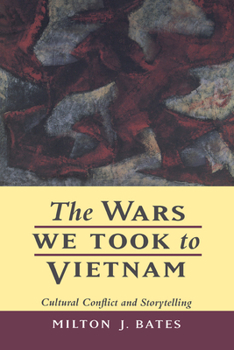The Wars We Took to Vietnam
Select Format
Select Condition 
Book Overview
What Americans refer to as the Vietnam War embraces much more than the conflict with North Vietnam. Milton J. Bates considers the other conflicts that Americans brought to that war: the divisions stemming from differences in race, class, sex, generation, and frontier ideology. In exploring the rich vein of writing and film that emerged from the Vietnam War era, he strikingly illuminates how these stories reflect American social crises of the period.
Some material examined here is familiar, including the work of Michael Herr, Tim O'Brien, Philip Caputo, Susan Sontag, Francis Ford Coppola, and Oliver Stone. Other material is less well known--Neverlight by Donald Pfarrer and De Mojo Blues by A. R. Flowers, for example. Bates also draws upon an impressive range of secondary readings, from Freud and Marx to Geertz and Jameson.
As the products of a culture in conflict, Vietnam memoirs, novels, films, plays, and poems embody a range of political perspectives, not only in their content but also in their structure and rhetoric. In his final chapter Bates outlines a "politico-poetics" of the war story as a genre. Here he gives special attention to our motives--from the deeply personal to the broadly cultural--for telling war stories.
Some material examined here is familiar, including the work of Michael Herr, Tim O'Brien, Philip Caputo, Susan Sontag, Francis Ford Coppola, and Oliver Stone. Other material is less well known--Neverlight by Donald Pfarrer and De Mojo Blues by A. R. Flowers, for example. Bates also draws upon an impressive range of secondary readings, from Freud and Marx to Geertz and Jameson.
As the products of a culture in conflict, Vietnam memoirs, novels, films, plays, and poems embody a range of political perspectives, not only in their content but also in their structure and rhetoric. In his final chapter Bates outlines a "politico-poetics" of the war story as a genre. Here he gives special attention to our motives--from the deeply personal to the broadly cultural--for telling war stories.
Format:Paperback
Language:English
ISBN:0520204336
ISBN13:9780520204331
Release Date:November 1996
Publisher:University of California Press
Length:325 Pages
Weight:1.10 lbs.
Dimensions:0.8" x 6.0" x 9.0"
Customer Reviews
0 rating





